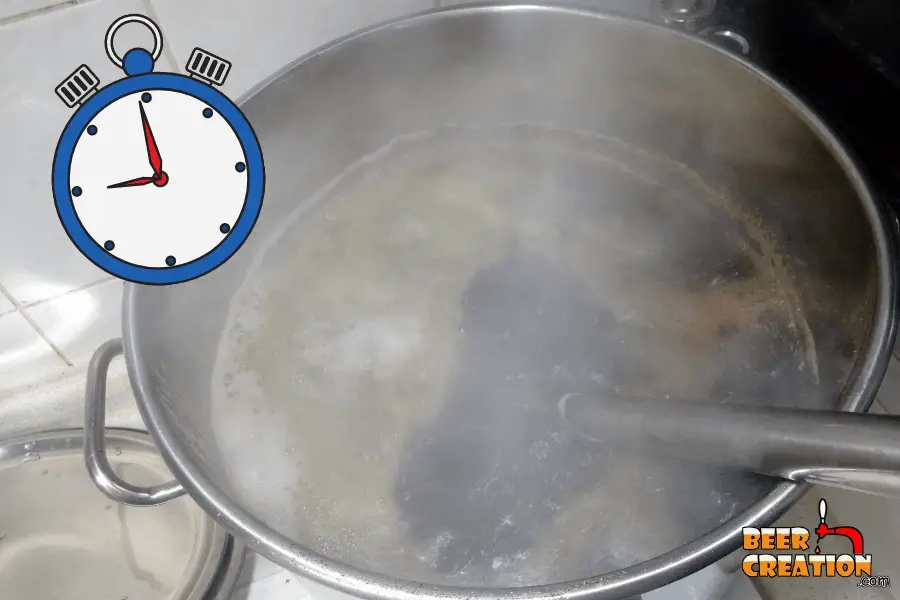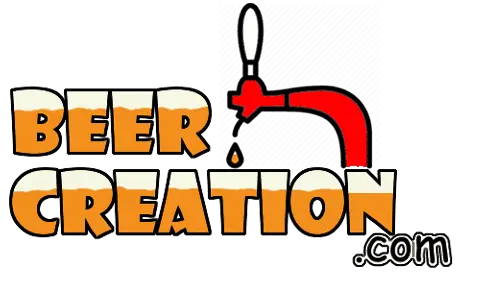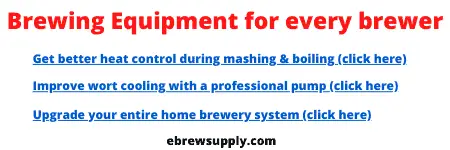The other day I got a message from a friend asking me questions about homebrewing. She wanted to buy a gift for her boyfriend and knew that he liked beer (see my gift suggestions here).
She had plenty of questions but the most pressing for her busy boyfriend was how much time he’d have to dedicate to brewing that first beer.
It’ll take 4 weeks until you can drink your average homebrewed beer but can take 2 or 3 times that for various beer styles. Your actual brew day can be as little as 1 or 2 hours with additional time spent on transferring & bottling/kegging the beer. But many factors can determine total brewing time.
No two beer styles are exactly the same and your choice of brewing technique as well as your own brewhouse will determine how long a beer takes to brew.
As I know that time is a major factor in enjoying this hobby to the fullest, I’ve gone through all the things that will add or subtract to the time it takes to brew that perfect beer. Please read on for more information.
How long will it take for the whole beer brewing process?

Although the process of brewing beer can be counted in weeks, the actual involvement of the homebrewer can be counted in hours. Depending on your brewing approach you actual brew day can be as little as 2 hours or as long as a typical day at work. For the most part, brewing is not labor intensive.
So, let’s discuss how long it takes to brew a beer from start to glass and also just how much of that time you’ll be needed for.
The major factors are as follows:
- Brew day – brewing technique
- Fermentation time
- bottling vs kegging
- brewing equipment
- brew house set up
Factors | Ales | Lager |
|---|---|---|
All-grain brew day | 3-5 hours | 3-5 hours |
BIAB brew day | 2-4 hours | 2-4 hours |
Extract brew day | 2-3 hours | 2-3 hours |
Fermentation | 1-2 weeks | 1-2+ weeks |
Bottling (5 gallons) | 2-3 weeks | 4-6+ weeks |
Bottling (labor) | 1-3 hours | 1-3 hours |
Kegging | 1-2 weeks | 4-6+ weeks |
Kegging (labor) | 30-60 minutes | 30-60 minutes |
Brewing from start to glass
Beer can largely be split into two general styles, ales and lagers. There’s more to it than that, but for our purposes, let’s keep it that simple.
An ale will take an average of 4 weeks from start to finish and the lager at least 6 weeks and usually more. The main difference between the two isn’t the actual brew day, it’s the fermentation and maturation period, either in a bottle or keg.
Ales and lagers will use often be brewed with different strains of yeast, one being top-fermented and the other bottom-fermented.
Not only does it take some strains of yeast extra time to attenuate (eat up all those lovely sugars in the beer), but for them to start cleaning up other byproducts produced during fermentation it requires extra time.
Add to this the fact that lagering (from the German for storage) is a complex process involving reducing the temperature of the fermenting beer over several weeks.
So, if you want to brew a beer quickly so that you can restock your fridge, an ale is always the best choice.
New to homebrewing? Please feel free to read my ultimate guide to brewing beer at home and where to start.
Time factors on your brew day
For much of the brewing process you as the brewer don’t even have to be in the same state, but on brew day you are the star.
This being said, this will be when you are at your busiest and there are many things that contribute to just how much time you spend brewing your beer.
Cleaning & sanitizing
You will need to clean the whole area, your equipment, and the system. A normal kitchen space will take 1-2 hours.
If you are in a garage or a place that is harder to clean double it. If this step is rushed and can lead to distorting tastes and infection so be thorough and spend the extra time.
A great tip to save time on your actual brew day and not have to get up with the larks is to clean your equipment the day before and just use your sanitizer just before you need to brew.
Brewing Method
There are 3 main ways to brew beer at home, all-grain, extract and Brew In A Bag (BIAB).
All-grain brewing, and BIAB, both involve mashing grain to extract sugar. However, with BIAB there is often less time spent on lautering the grains post-mash. (See my article for more information on BIAB).
If you are going to do extract brewing it will take about an hour to boil your wort plus your cleaning time before and after.
For all-grain brewing it’ll take about an hour to mash your grains, possible another hour to rinse them (lautering) and a further hour to boil your wort (3-4 hours).
Lastly, if you use the BIAB method you’re also looking at about 2 hours, possibly 3 with extensive cleaning.
The main difference between extract and All-grain brewing is that you don’t need to go through the mashing process with an extract kit and you don’t, therefore, have to spend time heating up strike water to lauter your grains. BIAB also cuts down on much of the time spent in traditional all-grain brewing.
Cooling wort
If you have a wort chiller it will take 10-60 minutes to reduce the boiling wort down to pitching temperature for your yeast (see my article on wort chillers here). If you are cooling overnight, it could take up to 24 hours (check out this article).
Pitching yeast- When using dried yeast, it’ll only take you about a minute to open it and sprinkle it on to your cooled wort.
When using a yeast starter, you’ll have to count the time it takes to prepare your basic wort (yeast food) and allow the starter to build up over a couple of days. This is all done before your actual brew day.
Bottling
Bottling can be pretty tedious if you don’t have the right set up. You’ll need about 5-10 minutes to prepare your priming sugar (you can also use carbonation drops (see Amazon).
Expect 1-2 hours cleaning used bottles by hand and less time if using a dishwasher. The actual bottling process can be as little as 30-90 minutes if you have a good production line set up for bottling and capping.
Kegging
If you have a keg then it’s pretty much like filling up one big bottle. Expect about 30-60 mins cleaning, transferring the beer (10-20 mins), and it could be ready to drink in as little as 2-3 days, but often Homebrewers allow a week or two for this process.
How can you speed up your brewing day?
As we’ve said, what you have to do on the actual brew day as a brewer can be determined by a number of choices you make.
To speed up your brew day you need to focus on streamlining the process with better preparation & organization of equipment and ingredients. Investing in certain pieces of equipment can also reduce the time of key tasks. Also the brewing technique you choose to follow will cut down on brewing time.
Some things to think about are:
- pre-cleaning equipment and your brew house
- preparing your ingredients the night before
- using a non-rinse sanitizer (link to Amazon)
- upgrading your wort chiller
- shortening your mash & boil
- opting for extract brewing
As there are so many factors at play here, I wrote an entire in-depth article exploring how you could speed up your brew day here.
How can you make your brew day less labor intensive?
There are two main ways to significantly cut down on how much time you need to be spending in your brew house on brew day; your recipe and your brewing equipment.
Choosing a lazy recipe
We’ve already mentioned that extract brewing will significantly reduce your brew day because it eliminates the need to carry out a mash. But there’s also the boil to think about.
If you opt for a beer style which has less hop additions then you can avoid the need of having to stand over your boiling wort adding hops every 10 or 15 minutes. Most recipes actually only need two hops additions, one at 60 minutes and one at flameout.
Shop for your brewing ingredients online at homebrewing.org
Automating your brew house
Apart from your choice of recipe, one other really easy (but pricy) way to reduce your time in the brewhouse is to automate the entire process.
All-in-one brewing systems, of which there are many on the market these days, allow you to mash and boil in the same vessel. Many also have pumps which allow you to easily lauter your grain in the same vessel too.
You can also find models which allow you to pre-program each stage in the brewing process, which means you can push start and come back when it’s all done (don’t forget those hop additions though!)
One of my top recommendations is the Grainfather, which you can find on many online stores including Amazon.

Check out Amazon for more details on current deals
How long does it take to make a lager at home?
Lager will take a bit longer to brew than an ale, at around 6 or more weeks and this extra time is basically just cold storing beer.
Your actual brew day and bottling/kegging day aren’t any longer than when brewing any other type of beer, it really is all to do with the maturation of the beer.
Lagering involves very precise temperature changes which allow the bottom-fermenting yeast to effectively clean up the beer of any byproducts of the brewing process.
If this process is rushed or not done at the correct temperatures you will not get the clarity and clean taste which you expect from a lager. So if you are out for a quick pint, steer clear of lagers.
What’s the best type of beer to brew quickly?
WhIle it is possible to brew a low ABV ale recipe in as little as a week, I would try to plan out some more time to get a better and higher ABV beer.
But if you really want to brew it quickly you want to use a highly animated yeast and forced carbonation. You will also need a beer style with a lot of character and is cloudy is as well.
You can have your beer brewed and ready to drink faster with good preparation so that on your brewing day you are more efficient which in turn will reduce the amount of time it takes to brew the beer.
In general, beers with a lower specific gravity should ferment faster as the yeast has less work to do. Using yeast which attenuates (eats sugars) faster is also an option. There is a yeast called Kviek yeast which allows you ferment the beer at a higher temperature (up to 98 degrees F) while regular yeasts can only withstand 55F to 75F without having off-flavors.
Some beers that are good to brew quicker are German Wheat, American Wheat, Porters, Stouts, IPAs (not dry-hopped), Pale Ales, and English Ales. To learn more about brewing beer quickly and for more inspiration read my article here: How Quickly Can You Brew Beer?
What types of beers take longer to brew but are really worth it?
Belgian beer and barley wine will take longer to brew to achieve higher alcohol content and full flavor. These beers have an ABV is between 6% to 12% but there is no exact number for a “strong beer” but anything higher than 8% is most commonly used.
When choosing if you want to have a strong beer you first need to know what characteristics you want from it.
Strong beers such as barleywines should have a good malt base that has a sweet and semidry finish. Belgian tripels, on the other hand, should have a light malt, with a spicy hop, and yeast flavors.
Your bock beers are should contain a malty and rich flavor with less yeast. Compared to stronger ales. If you choose to have an abbey ale these would be most often quite dark in color and have little to no dark malt sweetness. These are just a few examples but you get the idea, plan ahead for what you want and go from there.
What pieces of equipment will speed up my brew day?
As with many things in life, the right equipment will help you to do a task much more quickly.
Below are just some extra little toys which will significantly speed up your brew day.
Wort chiller

Cooling down your wort fast so that you can pitch it before any little nasties get into it is very important. If you don’t have a wort chiller at all this can take hours on a hot day. This is a really essential time saving device! See my top choice on Amazon.
Spray bottle

Although basic, if you put your Star San sanitizer into one of these little babies you’ll find that it’s really quick and easy to sanitize most of your brewing equipment. This is especially true when you have those little accidents and drop something. See this item on Amazon.
Keg

Although not technically on your brew day, a keg will save you time and effort when it comes to storing your beer. Bottling is a pain and kegging is just quicker. If you want to take the plunge, check out this keg from Amazon.
Brewer’s bag

Another way to reduce the time it takes to brew an all-grain recipe is to switch to BIAB brewing. It could seriously cut out nearly an hour of your brew day. Pick up a brewer’s bag today, which you can also buy on Amazon.
All-in-one brewing system
As I mentioned before, opting for an all-in-one brewing system is going to make brewing a whole lot easier for you. There are many models on the market and this is a slightly cheaper model which is just as effective. (link to Amazon).

Propane grill

By far the longest thing to wait for on brew day is to heat up your wort and strike water. If you are brewing on your kitchen stove, you may find that opting for a propane burner is going to save you lots of time getting to the boil. Again, you can find a number of great deal like this on Amazon.






